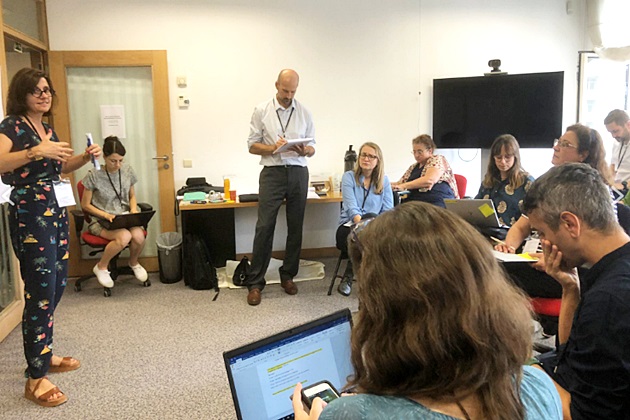789

Director of the CEFIDEC department, Dănuț Ungureanu, participated as an expert/guest, representing the National Mountain Zone Agency (ANZM), in the European Seminar "Rural and Mountain Development," organized by the National Agency for Territorial Cohesion in France, in partnership with the European Association of Mountain Regions - Euromontana, Eureka 21, and ADT Consult, as part of the "Rural and Mountain Development in Europe" project.
This meeting took place at the headquarters of the European Association of Mountain Regions - Euromontana in Brussels, Belgium.
The purpose of the seminar was to identify the European countries' policies targeting mountainous areas. One of the topics for discussion was dedicated to mountainous areas and their impact on climate change.
Examples of good practices from the Pyrenees, Carpathians, and Alps were presented, including existing or implemented policies in EU member states to adapt mountainous areas to climate change and manage tourist flows and water resources.
Existing policies in mountainous areas that can be replicated in other countries, as well as policies targeting rural areas that are distinct from agricultural ones and could be adapted for implementation in France, were discussed.
Approximately 60 people participated in the seminar, representing experts and representatives from France, Belgium, Austria, Italy, Romania, Slovenia, Spain, Germany, Estonia, Ireland, Poland.
The study, in which Romania, through the National Mountain Zone Agency, was involved, conducted a comparative analysis and interpretation of the results in five EU member states regarding adaptation to climate change in mountainous areas.
The five countries analyzed in this study were France, Austria, Italy, Romania, Slovenia, and Spain, considered representative of the mountainous realities in Europe.
The representative of ANZM participated in the meeting in the presentation room of the agenda topics and in the Working Group "Climate Change and Mountain Tourism."
In the Working Group, he presented the National Mountain Zone Agency, its general and specific objectives, institutional organization at the central and regional levels (Regional Mountain Development Centers and Mountain Development Offices), and their activities and tasks. He also explained Romania's Mountain Law, its main regulations, and how its provisions are applied. He emphasized the territorial organization of Massif Committees at the territorial level and the National Mountain Council at the central level. He presented investment programs for mountain areas, such as the Investment Program for establishing mountain pastures, the Investment Program for establishing milk collection and/or processing centers in mountain areas, and the Investment Program for establishing collection centers or collection and processing centers for forest fruits, mushrooms, and medicinal and aromatic plants from wild or cultivated flora in mountain areas.
He also highlighted the Agency's activities that contribute to the development of mountain tourism, including Local Gastronomic Points (PGL) for gastronomic tourism, specific vocational training, registration of agri-food products under the "Mountain Product" quality scheme, organizing the annual international conference "Turism and Rural Space in National and International Context" (TARS), and provided examples of relevant best practices that can be replicated in other mountain areas.
Individual discussions were held with representatives of other organizations and institutions, such as the European Commission, the European Mountain Research Network (NEMOR), Euromontana, the French National Agency for Territorial Cohesion, Eureka 21, and others.
The seminar highlighted that Romania has made significant progress in developing and implementing public policies for mountain areas and was presented as an example of best practices in this field. These experiences can serve as inspiration for other European countries with mountainous regions.




